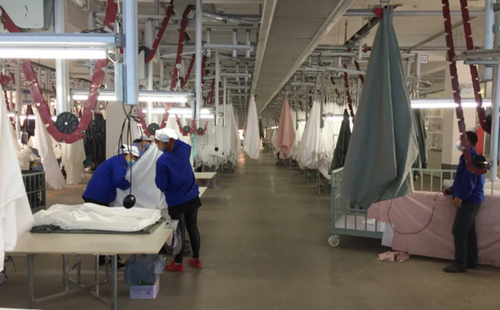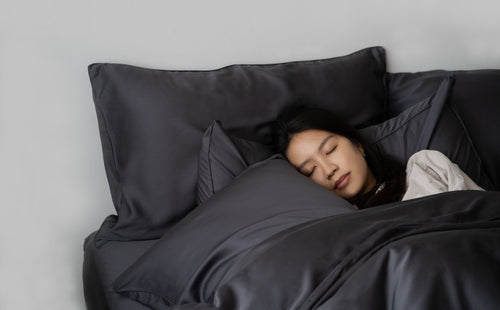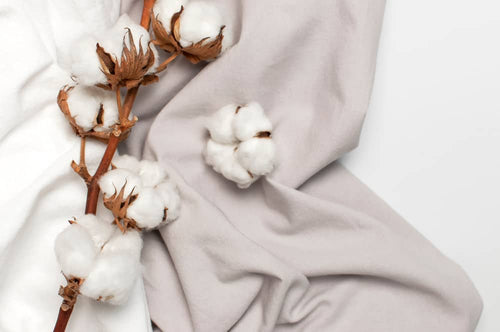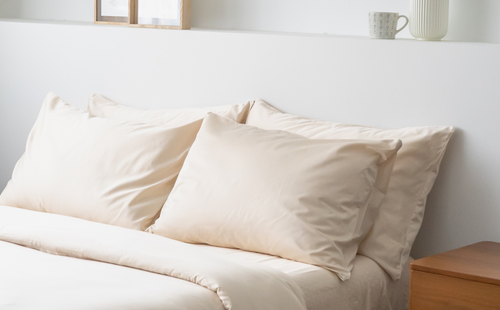At a glance
Good quality cotton sheets depend on fiber type, weave, and finishing. Understanding these factors helps you choose bedding that’s soft, durable, and breathable.
Quick tips
- Look for single-ply cotton with at least 300 TC
- Choose long-staple fibers for stronger, softer, longer-lasting sheets
- Prioritise certified, toxin-free fabrics for safe, healthier sleep
The quality of your bedding affects the quality of your sleep. This is why most people go into the nitty gritty when shopping for bed sheets. After all, nothing beats nestling into soft, comfortable bed sheets and waking up feeling fully refreshed!
Sheets can be made from different materials like cotton, TENCEL™, flannel, bamboo, or silk. Among the popular choices for fabric is cotton, and it is for a good reason. It is known for its soft, durable, and light material.
As a buyer, it pays to understand what goes into making the materials, helping you dive into a sound sleep. Doing so will guide you in choosing the right bedding and evaluating value.
Read on to know the materials, process, and all aspects of producing the best cotton bed sheets in Singapore!
Featuring Weavve's Cotton Flat Sheets
Materials Needed to Make Good Cotton Bed Sheets
Generally, the primary material required to produce top cotton bed sheets is raw cotton wool. Different types of cotton can impact the quality of the bedding.
Upland Cotton
As a widely grown cotton in the world, this is the most common type used to make sheets. If not specified, the material is likely made of upland cotton. It is relatively cheaper but may not be as soft as other types due to its short staple length.
Egyptian Cotton
Having longer, softer, and finer strands, this extra long staple (ELS) cotton promises extraordinary comfort. It is hand-picked (contrary to roller grinning or saw), thus, the fibers remain intact and straight.
These are a few of the reasons why Egyptian cotton bed sheets in Singapore can be expensive and are often associated with luxury. Egyptian cotton is tagged as the best cotton in the world, though heavy marketing may largely be behind this notion.
Pima Cotton
Just like Egyptian cotton, Pima cotton is also popular for its superior quality. Props to its long-staple sheet giving that unrivaled softness, breathability, and durability. The silky smooth surface and natural sheen of Pima cotton bed sheets also add to the impressive look and feel.
Supima Cotton
Supima is a trademarked name of superior Pima cotton. Supima cotton bed sheets are American-grown and produced with extra-long fibers. They need to be 1.5 inches long to ensure standard durability and softness.
Only a licensed supply chain can source the materials used to produce bed sheets. There is also a verification process to be considered Supima.

Image From Freepik
4 Aspects of Making High-Quality Bedding Sheets
You might be wondering, what makes the best cotton sheets? Several factors can affect the quality and process of producing them.
Thread Count
Thread count or TC refers to the number of threads per square inch of fabric woven in a crisscross pattern. Generally, a higher thread count signals finer fibers and softer texture. The ideal bed sheets' high thread count can range from 300 to 500 TC, but you may also go for 500-600 for increased thickness.
Beware of overly high thread count bedsheets. There could be misleading marketing claims behind them. The heat retention may also be affected given that extra threads are made to fit in one square inch of fabric. However, there could be an exception to this determined by the ply type.
Ply
A thread consists of layers or strands twisted together. Each layer is counted as one ply. Single-ply yarns are stronger, smoother, and lighter in contrast to multi-ply yarns having two to three strands.
Realistically, only 200-300 threads can fit into a square inch of fabric. But because two or three strands are counted for each thread, the number also inflates.
Some companies only use multi-ply to bump up the bed sheet thread count in making cotton bed sheets in Singapore. But these could result in weaker cotton fibers and sub-standard quality. Note that high thread count bed sheets only matter when they are single-ply or 1-ply.
Featuring Weavve's Cotton Deluxe Set
Yarn Count
Another aspect closely associated with thread count is the yarn count, the yarn size determined by its thickness and density. The higher it is, the finer the thread. An ideal base yarn count number is around 100s, but it can move up to 200 for maximum standard.
Staple Length
Staple length pertains to the length of the cotton fiber. As a general rule, the longer it is, the stronger the fabric. Long-staple cotton bed sheets have fewer filament connections and are more resistant to wrinkles and tears.
Extra-long staples like Egyptian cotton and Pima have 2-inch fibers. They are most sought-after due to their longer, incredibly soft fabrics.
How Are Cotton Sheets Produced?
How the best bed sheets in Singapore are produced may vary according to the manufacturer or brand. Usually, the main steps are as follows.
1. Harvesting Cotton
Cotton is grown in fields until the bolls, the fluffy white fibres, are fully mature. Once ready, the bolls are harvested either by hand or with machines, then sent for processing.
2. Spinning the Fibres
After cleaning and separating the seeds, the fibres are carded to align them and then spun into yarn. The thickness and strength of this yarn will later affect the softness and durability of the sheets.
3. Weaving the Fabric
The yarn is woven into large rolls of fabric. The weave pattern determines the texture, with percale giving a crisp, matte finish and sateen creating a silky, smooth feel.

Image From Freepik
4. Bleaching, Dyeing & Finishing
The raw woven fabric goes through treatments to remove impurities, before being bleached, dyed, or printed with patterns. Special finishes may also be applied, such as softening, wrinkle resistance, or mercerisation for added sheen and strength.
5. Cutting & Sewing
The treated fabric is cut into panels and stitched into fitted sheets, flat sheets, and pillowcases.
6. Quality Control
Every batch of sheets is inspected for weave consistency, colour accuracy, stitching, and overall finish to ensure they meet durability and comfort standards.
7. Packaging
Finally, the sheets are folded neatly, packaged in fabric bags or boxes, and prepared for shipping to stores or directly to customers.
The Impact of Cotton Bed Sheets Production on the Environment
Cotton bed sheets are made from natural, biodegradable fibres. However, some manufacturers in the textile supply chain treat them with toxic chemicals such as formaldehyde. While this helps fabrics stay wrinkle-free and stain-resistant, it is harmful to health.
Beyond chemical use, conventional cotton production also raises other concerns:
- It requires extensive water for irrigation
- Heavy use of pesticides and fertilisers contaminates soil and water
- Processing consumes high amounts of energy, adding to the carbon footprint
-
Certain practices damage ecosystems, degrade soil, and reduce biodiversity
When considering the materials used in bed making, it’s wise to look for options that protect both your health and the environment. One safe choice is sheets certified by Standard 100 by OEKO-TEX®, which ensures they’ve been tested for harmful substances. If sustainability is a priority, you might prefer TENCEL™ sheets, a material celebrated for its eco-friendly production process, silky softness, and excellent comfort, making it a responsible and luxurious option for everyday sleep.

Frequently Asked Questions
Is 600 Thread Count Good?
Yes, 600 thread count is generally considered very good. This number is ideal for cotton on bed sheets because of its softness, smoothness, durability, and premium feel.
Is Egyptian Cotton the Best?
Yes, Egyptian cotton is often hailed as the finest because its extra-long staple fibres spin into a fabric that is stronger, softer, and far more durable than most others.
Those longer strands make it possible to weave at a higher thread count with added flexibility, producing bedding, towels, and clothing that feel indulgently smooth, absorb moisture beautifully, and stand the test of time.
Is 100% Cotton 400 Thread Count Good?
A 100% cotton fabric with a 400 thread count is widely seen as an excellent choice, offering a balance of softness, breathability, and durability - though the overall quality still depends on the cotton variety and weave used.
Is 60% Cotton 40% Polyester Good Sheet?
Yes, 60% cotton and 40% polyester sheets can be a good choice.
This blend works well if you value durability, easy care, and affordability. It’s especially practical for busy households, student bedding, or anyone who wants sheets that dry quickly and resist creasing.
That said, it may not be the best option if you’re looking for luxury softness and maximum breathability. For hot sleepers or those with sensitive skin, 100% cotton or TENCEL™ sheets are usually the better pick, offering greater comfort, cooling, and a more natural feel.
Is 100% Cotton or 60% Cotton 40% Polyester Better?
It really comes down to what you value most. Choose 100% cotton if comfort, breathability, and a natural feel are your top priorities. Opt for a 60/40 blend if you prefer practicality, durability, and low maintenance.
Which Is Better, 500 or 1000 Thread Count?
Higher thread count doesn’t always mean better. While 1000 thread count sheets sound more luxurious, they’re often less breathable and heavier. Many manufacturers also achieve such high counts by twisting multiple thin fibres together, which doesn’t necessarily improve comfort.
500 thread count sheets are usually the sweet spot. They’re soft, smooth, durable, and more breathable than ultra-high counts, making them comfortable for most sleepers.
Is 50% Cotton 50% Polyester Breathable?
Yes, but not as breathable as 100% cotton. A 50/50 cotton–polyester blend still allows some airflow because of the cotton content, but the polyester fibres reduce breathability and trap more heat.
This means the sheets may feel warmer and less moisture-wicking compared to natural fabrics like 100% cotton or TENCEL™. However, the polyester makes them more durable, wrinkle-resistant, and easier to care for, which is why many people choose them for everyday use.
Will 52% Cotton and 48% Polyester Shrink?
A fabric made from 52% cotton and 48% polyester can shrink, though less than pure cotton. Cotton fibres naturally contract when exposed to heat, while polyester holds its shape. How much it shrinks really depends on care - hot washes and tumble-drying on high heat are likely to cause more shrinkage, whereas cold water, gentle cycles, and air drying will help keep the fabric in its original size.
Does Long Staple Cotton Shrink?
Yes, long staple cotton sheets can shrink, but usually less than regular cotton. Like all natural fibres, cotton tends to contract when exposed to heat and moisture. However, long staple cotton (such as Egyptian or Supima) is made from longer, stronger fibres that are more stable and resistant to shrinkage.
Soft Cotton Bedding in Singapore
All our luxury sheets are responsibly made with optimum care - from cotton sourcing down to the packaging. Made of 100% extra-long staple cotton threads spun into a 600 thread count bed sheet, our cotton sets are guaranteed to be soft. The threads are finer (100 yarn count) and made into single ply to give you stronger, smoother, and lighter sheets.
Our cotton bed sheets use a four over one sateen weave pattern, creating a lustrous sheen and buttery-smooth feel that you will love! They are also certified toxin-free, adhering to Standard 100 by OEKO-TEX®.








































